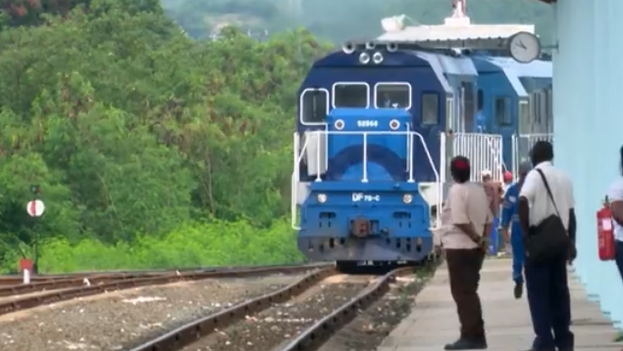
![]() 14ymedio, Yoani Sánchez, Generation Y, Havana, 18 September 2021 – I was stopping the train. This is not a metaphor. I would arrive at the platform with my mother and sister in the middle of the morning. The station and switchboard workers told us there were no longer scheduled departures. This was true for others, but we were not ordinary mortals: my father drove the locomotive, guided the iron serpent that would end up slavishly braking before our feet.
14ymedio, Yoani Sánchez, Generation Y, Havana, 18 September 2021 – I was stopping the train. This is not a metaphor. I would arrive at the platform with my mother and sister in the middle of the morning. The station and switchboard workers told us there were no longer scheduled departures. This was true for others, but we were not ordinary mortals: my father drove the locomotive, guided the iron serpent that would end up slavishly braking before our feet.
I was the daughter of a hero. He did not carry a shotgun, but rather drove the metal monster that populated every child’s fantasy. The difference is that I had him at home, I didn’t need to fantasize. They dreamed of an engineer, I lived with one every day: his long and agonizing days without getting home, the celebration of his return, and the fear that a bad crossing would end his life.
There is nobody on a platform at four in the morning. Just you and the belief that someone is going to pick you up. But we had no doubts. Whatever happens, no matter what they say… shortly, a snorting monster will pull up. Who made us believe that? My father: he assured us he would be there, despite the near misses, the unexpected and the derailments. He gave us confidence.
And there we were without hesitation. My mother, my sister and I, holding hands in that mixture of humidity and the sound of cicadas that are the train stations in the middle of “Cuban nothing.” Knowing that fate had given us our own titan of iron and steel, with a whistle at hand.
First it was just the belief, then a light wind came that tousled the hair behind our ears as the scent flooded us. It smelled of pig iron. This is what “perfume” is called when it comes from the friction of metal against metal when a convoy full of wagons stops on the line… it smells like pig iron, a word widely used in the rail industry, although to most people it sounds rare and novel.
My maternal grandmother knew this well because she had to incessantly wash the uniforms of her husband, also a railway employee.
Ana knew very well the “stink” that is left when, from the cabin, someone “puts the brake” on a locomotive that is dragging dozens of wagons screeching along the rails. It also creates some very peculiar crusts; they are black and when you remove them from your face with your fingers they feel very hard. They are the waste, on the human body, of the railroad.
It was the time when clothes were starched, which Ana did so well. She was the best. I ironed the edges of my grandfather and father’s shirts. They had an emblem in their pocket, on the gray cloth, that captivated us; it was a white rectangle embroidered in black of a locomotive giving off smoke. I always wanted (and managed it several times) to drive a train.
My paternal grandfather had a “doll’s hand.” One day, faced with the imminent crash, he threw himself from the locomotive but his ring got caught on a metal ledge. Then, like a magician, he would show us his four-fingered hand and we naive girls would laugh. They were the war wounds of our people. The killings of a railway clan.
But not everything was jokes or anecdotes. One day they started calling home to give condolences. Supposedly I had died in a train accident. It was my first and last name, but it was not me, but a younger, homonymous cousin who had been trapped by the crash in his early teens, accompanying his father, also an engineer. The scars accumulated on us.
In the mid-nineties, my father came home with a grimace on his face and a jacket that smelled of blood. His locomotive, failing to stop, had run over a herd of goats. We daughters jump on the feast; we were very hungry and he knew it. He was a provider; in those pieces of flesh and bone he gave us his “last hunt.” Then the railroad in Cuba ended up collapsing, the locomotive of our lives remained still.
However, the aroma lingers. My family smells like pig iron. My father died a little over a week ago and I returned to the symbolic platform of waiting. First the wind came and shook my short hair. The railwayman’s daughter knows only one perfume. It is the balm of existence, the same one I felt when I stood on the line in the middle of the morning and unknown voices assured me that the train was not going to stop, but I knew it would: I smelled what was coming.
____________
COLLABORATE WITH OUR WORK: The 14ymedio team is committed to practicing serious journalism that reflects Cuba’s reality in all its depth. Thank you for joining us on this long journey. We invite you to continue supporting us by becoming a member of 14ymedio now. Together we can continue transforming journalism in Cuba.
